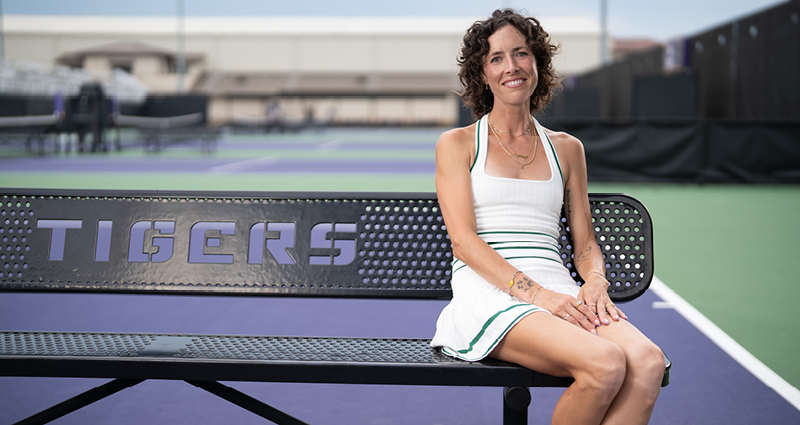Tennis is life to Shelby Dufrene. She played tennis in college at University of Louisiana – Lafayette and has taught tennis in Baton Rouge for more than three years. Nothing could keep her from the tennis court — even a diagnosis of stage 3 pancreatic cancer.
And it was thanks to one of her tennis students, a local doctor, who gave her the advice in February 2023 to seek emergency care after she complained of stomach pains during a lesson. The doctor also noticed the yellowish appearance of her skin and the whites of her eyes.
Shelby, now 33, had recently been to a walk-in clinic for a sinus infection, where she was prescribed amoxycillin. She had wondered at first if the yellow hue of her skin and eyes was a reaction to the antibiotic, but she went to the Our Lady of the Lake Regional Medical Center emergency department to get further evaluation.
The emergency care team told her she had a swollen gall bladder and a small mass sitting against and blocking her bile duct. She needed a procedure to evaluate the mass and relieve the blockage in her bile duct.
An Unexpected Diagnosis
When she came out of the endoscopic procedure, though, everything changed. She first noticed the expressions of her family members who were waiting for her to get back to her hospital room.
As patients sometimes choose, Shelby worked with her care team to allow her family access to her surgery updates and information on their findings.
“They were all standing against the wall crying, and my mom sat on the bed next to me. She was the one who told me that it was cancer,” Shelby remembers.
During the procedure, doctors discovered the mass in her pancreas was a cancerous tumor. That was when surgical oncologist Mo Al Efishat, MD, FSSO, FACS, became a key part of Shelby’s care team.
“It’s not an unusual problem seeing someone young who presents to the hospital with jaundice and yellow eyes. It’s commonly a stone in the bile duct causing blockage,” he says. “You rarely think of pancreatic cancer for someone Shelby’s age.”
Expert Hands for a Complex Surgery
The most common procedure used to treat pancreatic cancer is also an incredibly complex one. Known as the Whipple procedure, it’s something Dr. Mo specializes in.
Dr. Mo uses minimally invasive robotic techniques to remove the head of the pancreas, the gallbladder, and the duodenum (part of the small intestine). He also removes part of the bile duct and nearby lymph nodes to achieve oncologic resection. In some cases, parts of the stomach, colon or blood vessels may be removed as well — anything that may be involved in the cancer. The remaining pancreas, stomach and bile duct are reattached to the small intestine so the GI tract can return to normal functions.
Because the procedure involves a rerouting of the GI tract, patients typically stay in the hospital for five to seven days before returning home. Full recovery at home can take up to six weeks. Patients need some diet changes, supplements and antacids to ease the body back to normal.
“I’ve had surgery before, so I thought, ‘It’s just surgery. I’m not worried about it,’” she says. “Even now, it doesn’t fully feel like it’s set in that I’ve had a chunk of my intestines removed … and that all of this happened in the span of eight months.”
But the hard part wasn’t over.
Shelby’s Cancer Treatment Journey
Her care team — now including oncologist Vince Cataldo, MD — had to wait to allow her to gain back an appropriate amount of weight so she could start chemotherapy to remove any remaining cells of pancreatic cancer in her system.
She gained weight quickly and was able to start chemotherapy in a month and a half, instead. This is the ideal time for giving chemotherapy following surgery.
“I think that’s one of the advantages of performing the procedure robotically,” Dr. Mo says. “Patients usually recover faster with less pain. But overall, the Whipple procedure is one of the biggest procedures you can have in your abdomen. Shelby did really well, but it’s rarely ever an easy recovery for anyone.”
Chemotherapy started in April 2023 and finished that October. Over the course of surgery and chemotherapy, Shelby had gone from 130 to 86 pounds.
Getting back to a healthy weight is taking time, but she’s working with a nutritionist and has so far had clean scans during checkups with her cancer care team.
Shelby was also back on the tennis court in March 2024, and by May she was back to teaching full time. She continues to work toward full recovery.
“I was thinking once this was done, I was going to bounce back immediately. I would be back at work within a couple weeks and life would be life again,” Shelby says. “It took a lot longer. There have been a lot more challenges than I was expecting.”
A Team in Her Corner
But she’s had Dr. Mo, Dr. Cataldo and the rest of her cancer care team in her corner. They know her goals to be back on the tennis court full time, and they are working with her and the multidisciplinary cancer team to achieve that goal.
“Shelby has been a true champ throughout this very difficult journey. It’s very inspirational,” Dr. Mo says. “She’s one of my many memorable patients. Shelby had to fight multiple battles, and she beat them and came out the other side of this stronger. So I’m very proud of her and very privileged that I am part of the team that continues to take care of her.”
As for Shelby, she thinks back to the day in February 2023 when she came out of surgery and her family stood around her bed while she got the news of pancreatic cancer. Her family was ready to pack up and move to Houston for her to seek care at a cancer center there if she chose to, but she chose otherwise.
“If I had to go back and do all this again, I wouldn’t have changed a single thing,” she says. “I had the best surgeon, the best oncologist and the best cancer care team. The quality of care that I received and continue to receive surpassed my expectations. I was very blessed with my care team.”
Shelby was honored as one of Our Lady of the Lake’s Geaux Heroes, recognizing her incredible story of strength and resilience. She was honored on the field of Tiger Stadium during the LSU football game against Vanderbilt on Nov. 23, 2024.




